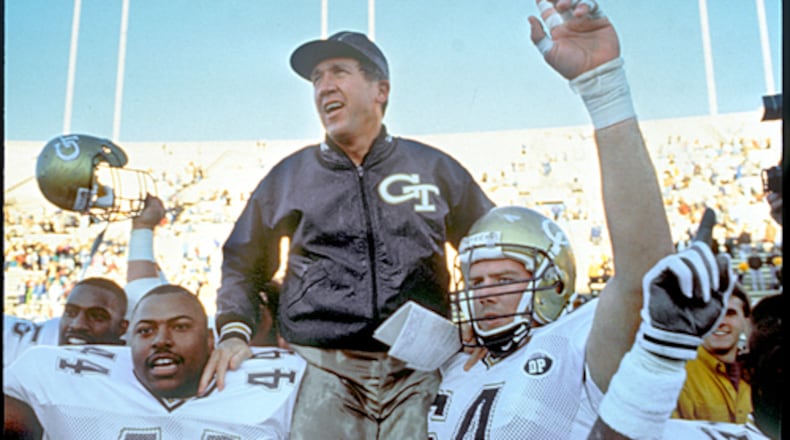On Oct. 12, Texas and Oklahoma will renew hostilities in the annual Red River Shootout. As ever, the game will be staged in the Cotton Bowl, smack in the middle of the Texas State Fair. This part is new: In 2024, Texas-OU will be a Southeastern Conference game.
On Nov. 23, Stanford will travel to Berkeley to meet Cal in the latest installment of what’s known as The Big Game. Plot twist: This Big Game will be an Atlantic Coast Conference game, though California Memorial Stadium sits four miles from the Pacific.
That same day, USC will bus up the 110 to face UCLA, which plays home games in the Rose Bowl, which has a long affiliation with the Big Ten. Never, however, has the famous stadium played host to a Big Ten game, which the 94th edition of Trojans-Bruins will be.
That same day, Washington State will oppose Oregon State in Corvallis. Technically, this is a Pac-12 game, though Wazzu and the Beavers are competing in the Mountain West this season. The two represent the last vestiges of a Power 5 conference.
Department of Duh: This will take some getting used to. So much has changed about college football – have we mentioned the tripled-in-size playoff? – that we might never get used to it.
Then again, we might.
As mentioned, this correspondent dislikes almost everything college football is doing. Full disclosure I’ve disliked something about the sport from the time I started watching it. The year was 1968. My favorite player was a Trojan tailback named O.J.
There was no national championship game then. The biggest name in the sport didn’t deign to grace a bowl, though Notre Dame would change its mind. On New Year’s Eve 1973, the Irish claimed a national title by beating Alabama in the Sugar Bowl, though Bama also claims that year’s natty because it finished No. 1 in the final UPI poll, held before the bowls. Why take a “final” poll with a game remaining?
Nobody would have designed a sport like that, which was the problem. There was no design. Bear Bryant picked whatever bowl he wanted; everybody else fell in line. The granddaddy of them all was the notable exception, though the Rose Bowl’s partnership with the Big Ten and Pac-8 was weird, too. A Rose appearance could be decided by which tied team visited Pasadena less recently.
We jump ahead to 1990. Still no national championship games. How could the biggest collegiate sport remain the one collegiate sport that didn’t decide its champ on the field of play?
Colorado, with one loss and one tie – and one “victory” that involved a fifth down – entered its Orange Bowl with Notre Dame ranked No. 1. The Buffaloes won by the smallest possible margin (one point) after a last-minute Rocket Ismail touchdown return was overridden by penalty.
Georgia Tech entered the Citrus Bowl against Nebraska ranked No. 2. The Yellow Jackets hadn’t lost. Their blemish was an October tie at North Carolina. Two weeks later, they beat No. 1 Virginia in Charlottesville. They finished the regular season as the nation’s only unbeaten team, which should have moved them to No. 1, but the Big Eight had greater cachet than the ACC.
Tech destroyed Nebraska. ABC’s Brent Musburger spent the fourth quarter lobbying voters to anoint the Jackets. The next day, the team arrived in Atlanta to news it finished No. 2 – Colorado drew 39 first-place votes to Tech’s 20 – in the AP poll. Then something that could only have happened in college football happened.
UPI – having gone to post-bowl balloting! – had trouble finding one of its voting coaches. More than 24 hours after the Jackets exited the field in Orlando, they learned they’d shaded Colorado by the smallest possible margin (one point) and were UPI’s champ. Some Jackets got word of their triumph while attending a Tech basketball game. That happened Jan. 2, 1991.
Over the past 34 years, college football has seen the arrival of an actual playoff and now a bigger playoff. It has seen conference realignment to the extent that geography is as quaint a concept as the rotary phone. There’s a transfer portal. There’s NIL. There’s a sport we scarcely recognize, but – to be fair – is it worse than the sport that, for decades, played a season and let voters sort things out?
The term “hate-watch” is a product of our streaming world, but the notion isn’t new to this viewer. I’ve hate-watched college football for 50 years. Am I crazy about what the sport has done lately? Nope. But I doubt I’ll stop watching.
About the Author
Keep Reading
The Latest
Featured




